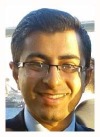 Salman Tahir, achieving dreams beyond possibility
Salman Tahir, achieving dreams beyond possibility
“Someone has to stand up to this fanaticism and promote a tolerant, open-minded and responsible civil society.”
—Salman Tahir
On March third, 2009, gunfire shattered the windows of Salman Tahir’s classroom. He ducked to avoid flying shards, and dread gripped him, sinking to the pit of his stomach. Lahore had been considered one of the most secure urban centers in Pakistan, yet twelve gunmen had opened fire on a bus carrying the Sri Lankan Cricket Team outside of Salman’s high school. Six players were wounded with six policemen and two civilians killed. Lashkar-e-Taiba, a terrorist outfit, believed that playing cricket was a violation of Islam.
It wasn’t just the traumatic proximity of death that troubled Salman, but a fear that threatened his future. The space for free speech and progressive thought was shrinking in Pakistan, replaced by an increasingly prevalent radicalism.
“Our citizens live under constant threats of bomb blasts and indiscriminate killings by the terrorists. The state institutions are crumbling in the face of religious extremism and terrorism.” Salman’s worst fear is that extremists will capture state power. Individuals must remain free to express opinions, demand their rights, and practice their own religion, culture and traditions freely. Salman believes that the only way to offset the influence of extremists is through the socio-economic development of Pakistan.
After the incident, Salman began his study of political science at Lahore University of Management Sciences (LUMS). The courses along with work experience at organizations like UN Development Program presented Pakistan’s situation in a global context. They also stirred Salman’s hope and interest in the field of international development. He believes major socio-economic challenges can only be solved through international networks.
Representing Pakistan as a youth ambassador for the Leadership Initiative for Excellence (LIFE 2013), organized by The Global Education and Leadership Foundation (tGELF) in New Delhi, India, introduced Salman to people from over thirty countries. The conference aimed to ameliorate inter-regional relations between India and Pakistan by creating channels of communication and cooperation among the youth of the two countries. Contributing to an initiative of such importance was “a huge deal for me,” Salman says, especially the chance to show his Indian hosts that the civil society of Pakistan desires peaceful coexistence.
Also in 2013, Salman served as assistant manager of Public Affairs and Foundation Development for the Human Development Foundation (HDF) an organization tackling poverty through social mobilization, education, healthcare, and economic development in a sustainable environment.
During Salman’s four undergraduate years, he combined professional and non-professional roles in the non-profit sector, including experience as an intern, volunteer, and researcher in organizations like UNDP, Acumen Fund, The Citizens’ Foundation, Ministry of Foreign Affairs, and the British Council. He gained international exposure through conferences, programs, and trips to the US, Switzerland, India, China, Middle East, and the UK.
Salman took an exciting dive into alphabet soup as a Fellow in Discover The International Geneva program organized by UN Association-Switzerland and GIMUN, affording an in-depth overview of international activities hosted in Geneva. He took part in training and lectures at the Graduate Institute of International and Development Studies; the Swiss Permanent Mission to UN; the 26th Session on Human Rights Council on Women Rights (UNHRC); WHO; UNHCR; IOM; Interpeace; Red Cross; Doctors Without Borders; WIPO; WTO.
One of Salman’s long-term objectives is to start a non-profit social enterprise that would find sustainable solutions to poverty, enabling participants to play an active part in their own development. At HSI, Salman pointed out that there is no recycling program in Pakistan and presented a project to recycle scrap materials called Trash2Cash. Workers would utilize scraps to make quality products like briefcases and embroidered purses to be sold through ecommerce. The program employs and empowers women who can only work in the home.
Currently, Salman attends the Central European University (CEU) in Budapest, Hungary. He’s working toward his master’s degree in international relations and European studies to better achieve his mission to bring about transformative social change. He’s learned from various crises to devote himself to achieving dreams that may seem well beyond possibility.
